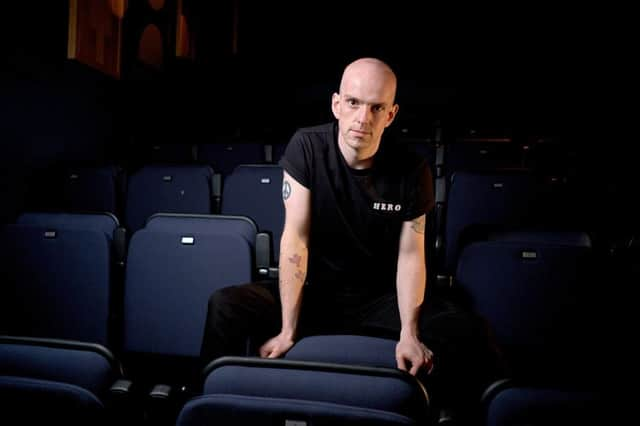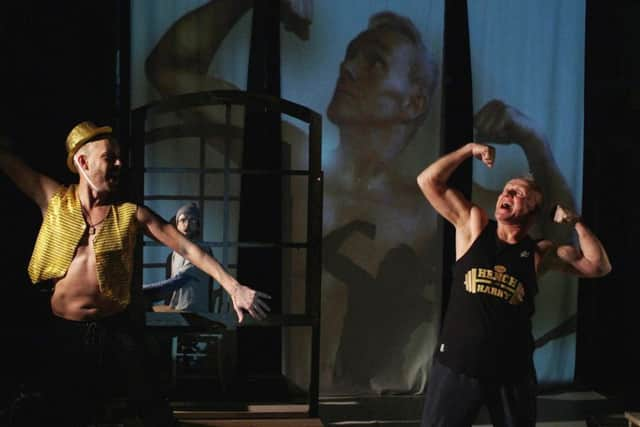How personal experience of body dysmorphia and gym culture inspired Andrew McMillan’s new take on Dorian Gray


Andrew McMillan has had a pretty impressive few years. His debut poetry collection Physical won the prestigious Guardian First Book Award in 2015, the first time a poetry collection had won the prize in the 17 years it had been running and only the second time that a poet had made it on to the shortlist.
The collection also won the Fenton Aldeburgh First Collection Prize, a Somerset Maugham Award and an Eric Gregory Award in 2016. It was shortlisted for several others including the Dylan Thomas Prize, the Costa Poetry Award and the Forward Prize.


Advertisement
Hide AdAdvertisement
Hide AdIt was an extraordinarily accomplished collection – an exploration of male friendship and love, a visceral, candid and lyrical celebration of physicality, sensuality and the body – and was, rightly, hailed by Sarah Brown in The Guardian as “the sort of once-in-a-generation debut that causes everyone to sit up and take notice.”
His second collection, playtime, published by Jonathan Cape last year, was equally lauded. Described by Alan Bennett writing in the London Review of Books as “vivid, accessible and honest, sometimes uncomfortably so”, it was a Poetry Book Society Recommendation for autumn 2018 and was named a Poetry Book of the Year in The Sunday Times.
Poetry is in McMillan’s bones – he is the son of Ian, the ‘Bard of Barnsley’ – and he has said in the past that all he wants for his work is for it to “live sincerely in the world and take everything that happened… and give it back to the reader – in the hope that it might move them or be ‘useful’.”
As his work clearly speaks to many people, his achievements as a poet look set to keep soaring – earlier this year he was one of three poets in the running for the post of Oxford Professor of Poetry – and he is still only 31. Now he is taking on a different challenge with his first stage play Dorian, which opens at the Square Chapel Arts Centre in Halifax tomorrow night before going on tour.
Advertisement
Hide AdAdvertisement
Hide AdPresented by the award-winning Proper Job Theatre Company, Dorian is a retelling of Oscar Wilde’s The Picture of Dorian Gray and is the third in the company’s Monster Trilogy which sees classic pieces of literature adapted for the stage by renowned poets.
The first Nosferatu was written by McMillan’s father Ian and was followed by award-winning Sheffield poet Helen Mort’s reimagining of Medusa.
Dorian uses poetry, physical theatre, images and music to explore masculinity, body dysmorphia and gym culture. It tells the story of a middle-aged man, Dorian, who decides to try and change his life by attempting to get the body of his dreams.
He hires a personal trainer, signs up to a six-month training programme and then things begin to go awry. As his body transforms, he is unable to see the changes and his gym addiction starts to take over his life.
Advertisement
Hide AdAdvertisement
Hide Ad“I have long been fascinated by the world of theatre, so it was an honour to be approached by Proper Job to work on the project,” says McMillan. “Helen Mort had put my work in front of them and they knew they wanted to do something with The Picture of Dorian Gray so then we started talking about what a play based on that story might look like. The idea of gym culture and body dysmorphia came up fairly early in those conversations and it clicked into place quite quickly really.”
McMillan then went back to Oscar Wilde’s 1891 source novel and re-read it several times. “I tried to get into the language of it and I have used quite a lot of the original language in the play. It’s a novel that very few people have read but most people can tell you what it’s about.
“It is a strange novel to read – it is very florid and quite meandering but it has a central idea that everyone can understand. I think one of the joys of poetry is that you are capturing a moment, no one needs to know what happens before or after, it’s a glimpse of something, but with a stage play you have to think about the motivation of the characters and where they fit into the world of the play. You have to think in three dimensions, so I read some of the passages of the novel out loud and thought about what was physically possible.”
He enjoyed the collaborative process, working with Proper Job, the producer, director and cast. “There were some interesting moments,” he says, laughing. “I discovered that I was writing too many stage directions and they told me ‘you just give us the language’. And then there was something towards the end of the play that I had written in a certain way but the actors had flipped it on its head – they hadn’t changed any of the words, but it was different and it was infinitely better. They all had a part in making this piece.”
Advertisement
Hide AdAdvertisement
Hide AdMcMillan has personal experience of eating disorders and body dysmorphia, and this informed his writing. “When I was a teenager, about 15 or 16, I started going to the gym and working out too much to try and get thinner. “I know about looking in the mirror and not being able to see what’s there – I think a big part of it is about control – and I was able to articulate that.
“The idea was to be able to write from that space of having experienced it.
“What I ended up writing about was two different sorts of body dysmorphia – Dorian’s, he is becoming bigger and he can’t see it, and then his son’s who is very aware of his own appearance and is trying to become thinner.”
The themes of masculinity and what it means to be a man today are present in McMillan’s poetic works and these are issues which he also explores in Dorian. “I’m interested by the idea of toxic masculinity and I’ve been trying to do a lot of writing about it in different forms.
Advertisement
Hide AdAdvertisement
Hide Ad“There is a generation of young men in particular who feel that they can’t take up the space they used to and that coincided with gyms becoming more accessible so you would find men wanting to take up space with their bodies because they can’t in other ways. It seems to me that is connected to other socio-economic issues. And social media has had a lot to do with that too – everyone now potentially has this gallery space to present their own bodies. For me as a young gay man I find it fascinating that gym culture is often seen as being a kind of playground of masculinity for straight men to look at other men and their physiques. The play taps into that and asks what’s really true – there is this false persona and then there’s the real person.”
For McMillan working in the collaborative way that theatre requires has been a hugely rewarding experience. “I really like the space it has allowed me for extended thought, to expand the narrative and to explore what’s happened before or after the moment. And it’s been a much less lonely pursuit than writing poetry – this has felt much more like a continuing conversation with the director and the actors, so hopefully it’s the beginning of something.”
Book was originally censored
Oscar Wilde’s acclaimed book – The Picture of Dorian Gray – was his only novel and was first published in 1890 in an issue of Lippincott’s Monthly Magazine.
However the editor, who felt the story might cause offence, censored it, deleting around 500 words, without informing Wilde beforehand.
Advertisement
Hide AdAdvertisement
Hide AdMany reviewers were indeed offended, with some even suggesting Wilde should be prosecuted for violating the laws guarding public morality.
Wilde put up a strong defence for his novel and for art in the Press.
The longer, revised version of the story was published as a novel in book form in 1891 and included a preface in which Wilde defended the rights of artists.
Dorian by Andrew McMillan is at Square Chapel Arts Centre, Halifax, October 15, the Lawrence Batley Theatre, Huddersfield, October 17, Cast Doncaster, October 22 and The Civic, Barnsley, October 24.